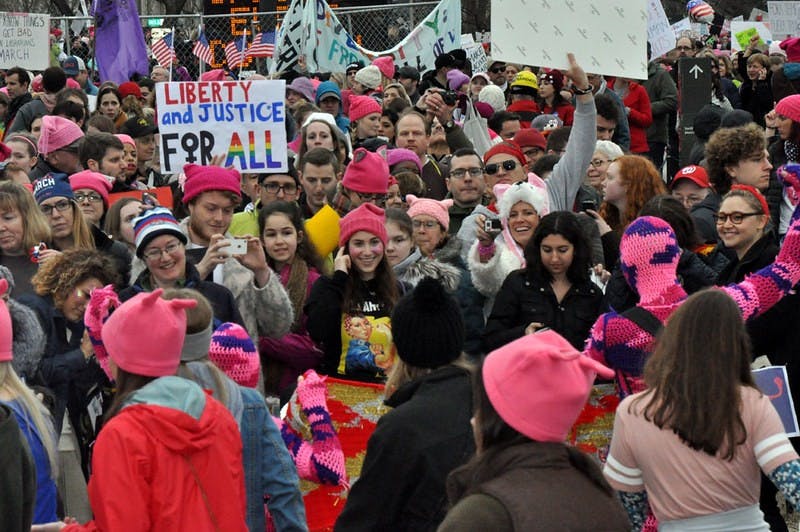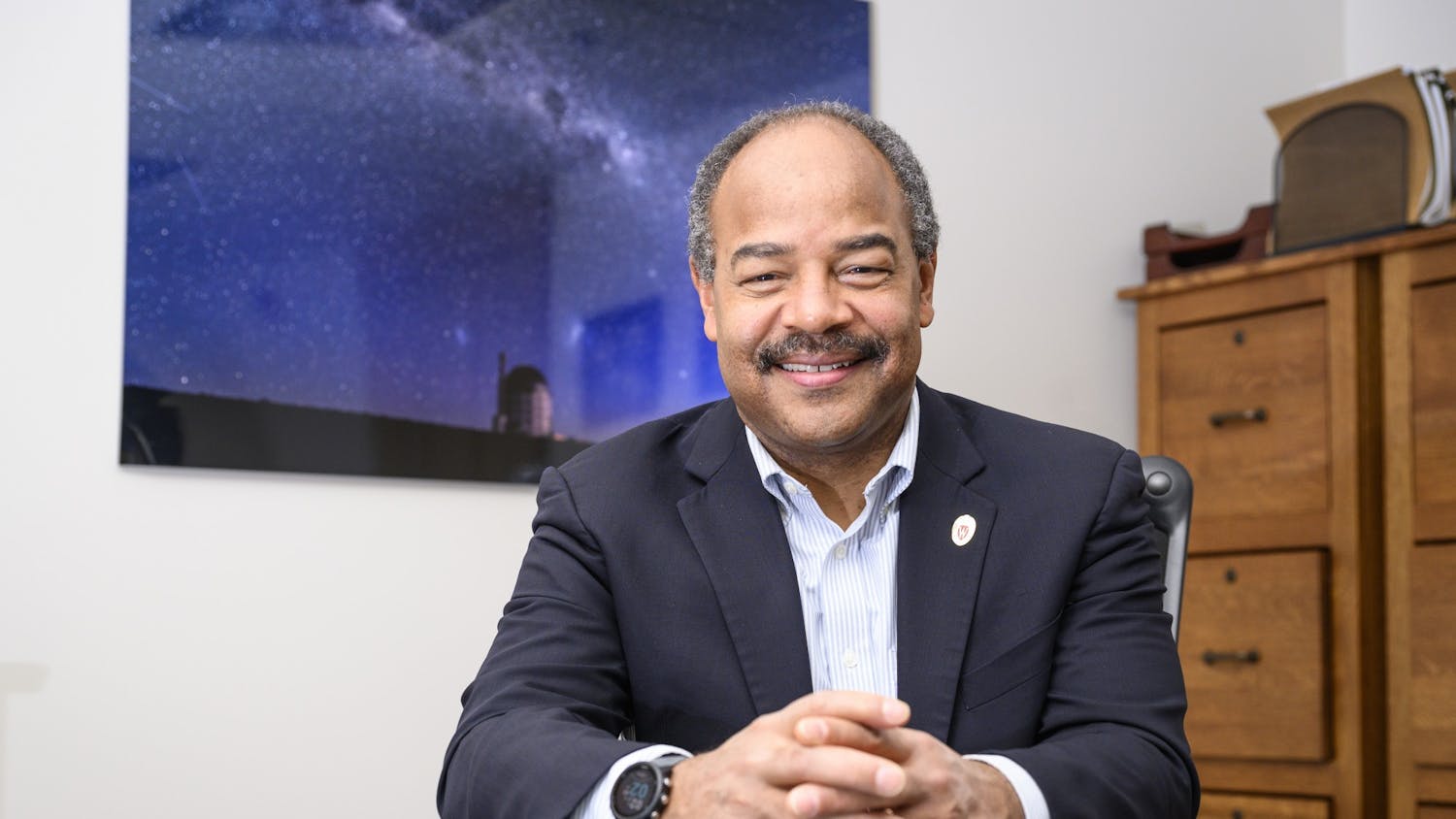Madison abortion rights activists will lead demonstrators in over 100 communities nationwide during the flagship 2023 National Women’s March event this Sunday at the Wisconsin State Capitol.
Feminist activist group Women’s March is one of two groups leading Sunday’s “Bigger than Roe” march for abortion rights. The organization rose to prominence in 2017, when it led 2.6 million people from 32 countries in a mass demonstration for gender equality following Donald Trump’s inauguration, according to USA Today.
Joining Women’s March is the Madison Abortion and Reproductive Rights Coalition for Healthcare (MARRCH), a grassroots organization that’s led numerous local demonstrations for women’s and LGBTQ+ rights. MARRCH led a community protest against conservative commentator Matt Walsh’s visit to the University of Wisconsin-Madison in October.
The event is scheduled to begin this Sunday at 11 a.m. on Library Mall, according to MARRCH. Demonstrators will then march up State Street to the Capitol, where representatives from Women’s March, MARRCH and over 20 partner organizations will deliver speeches beginning at 1 p.m. The group also plans to hold a “speakout” in the Capitol rotunda for event attendees.
“MARRCH looks forward to having the support of multiple unions … the Women’s March and the people of Madison, in showing Wisconsin politicians that we will not give up our rights to bodily autonomy, reproductive freedom and abortion,” the group said in a statement to the Daily Cardinal.
MARRCH previously hosted local chapters of Women’s March demonstrations and is “excited” to host this year’s flagship Women’s March event, spokesperson Amadi Ozier said in an email.
“Wisconsin has been a hot seat of grassroots reproductive justice work for the past six months,” Ozier wrote. “The work that has been done in Wisconsin is a testament to the many similar fights taking place in other battlegrounds across the nation that do not always get the same press attention as larger cities.”
MARRCH plans to make six demands of state and federal lawmakers Sunday, which they shared with the Daily Cardinal:
- Provide free, on-demand abortion
- Overturn Wisconsin’s 1849 near-total abortion ban.
- Divert a portion of Wisconsin’s more than $6 billion budget surplus to fund travel expenses for pregnant people seeking abortion care in neighboring states.
- Establish a “medically sound” sex education curriculum for all Wisconsin students, including nonbinary and trans youth.
- Repeal the Hyde Amendment, a federal policy first passed in 1976 that blocks federal Medicaid funds for abortion care with few exceptions.
- Immediately reopen Wisconsin abortion clinics.
Former Lt. Gov. Mandela Barnes and “several” Wisconsin Supreme Court candidates plan to attend Sunday’s event, according to MARRCH.
Over 100 “sister marches” are scheduled nationwide for Jan. 22, according to a map on the Women’s March website. Three Wisconsin communities — Wausau, Elkhorn and Minocqua — are scheduled to hold events.

An estimated 500,000 activists attended the first-ever National Women's March in Washington, D.C. on January 21, 2017 to support gender equality and protest then-President Donald Trump's inauguration from the day before. Many demonstrators wore now-iconic pink "pussyhats" as a symbol of resistance to patriarchal power.
Abortion rights battleground
This year’s flagship Women’s March falls on the 50th anniversary of Roe v. Wade, the landmark 1973 Supreme Court case that guaranteed federal abortion rights protections for pregnant people.
The U.S. Supreme Court overturned Roe last June in Dobbs v. Jackson, reinstating an 1849 law that bans virtually all abortions in Wisconsin. The ban includes cases of rape or incest, with a lone exception for cases where a pregnant person’s life is in danger.
At least 12 other states have near-total abortion bans as of Jan. 6, according to The New York Times.
Thousands of Wisconsin abortion rights activists organized a snap protest at the State Capitol after a draft majority opinion overturning Roe was leaked in early May. Months of demonstrations followed, including another large protest the day after the Dobbs decision was officially issued.
Gov. Tony Evers and Lt. Gov. Sara Rodriguez held another abortion rights rally outside the Capitol on Oct. 4 in support of a constitutional amendment that would allow Wisconsinites to vote on the state’s abortion ban.
Evers called a special session of the Legislature the same morning to consider his proposal, but Republican leaders adjourned the session in seconds with no debate.

Democratic Attorney General Josh Kaul filed a lawsuit challenging the 1849 abortion ban in June. The lawsuit is currently pending in the Dane County Circuit Court but could eventually reach the Wisconsin Supreme Court, according to a November report from Wisconsin Public Radio.
Republicans currently hold a slim 4-3 majority on the court. But that could change this April when Wisconsin voters decide who will replace retiring conservative Justice Patience Roggensack.
It’s not clear if Kaul’s legal challenge will reach the court before Roggensack’s term expires or how justices would vote, though a post-election liberal majority could tilt an abortion lawsuit ruling in Democrats’ favor.
Kaul told WPR in November that legislation repealing the ban would be a better option than the lawsuit.
But Republicans are split on whether to amend the 1849 ban, much less repeal it. Although Assembly Speaker Robin Vos (R-Rochester) told the Associated Press last month that he would support adding rape and incest exceptions to the 1849 abortion ban, Senate Majority Leader Devin LeMahieu (R-Oostburg) remained wary of voting on such a proposal.
Even if the Republican-controlled Legislature approves a bill adding rape and incest exceptions to the 1849 law, Evers is unlikely to sign it. The Democratic governor told the AP in December that any proposal which maintains the 1849 law — even with exceptions — is a “non-starter.”
Editor's note: This story was updated at 8:43 a.m. on Wednesday, Jan. 18 to accurately reflect the number of demands from MARRCH.
Tyler Katzenberger is the former managing editor at The Daily Cardinal. He also served as the state news editor, covering numerous protests, elections, healthcare, business and in-depth stories. He previously interned with The Capital Times, Milwaukee Journal Sentinel and is an incoming POLITICO California intern. Follow him on Twitter at @TylerKatzen.






